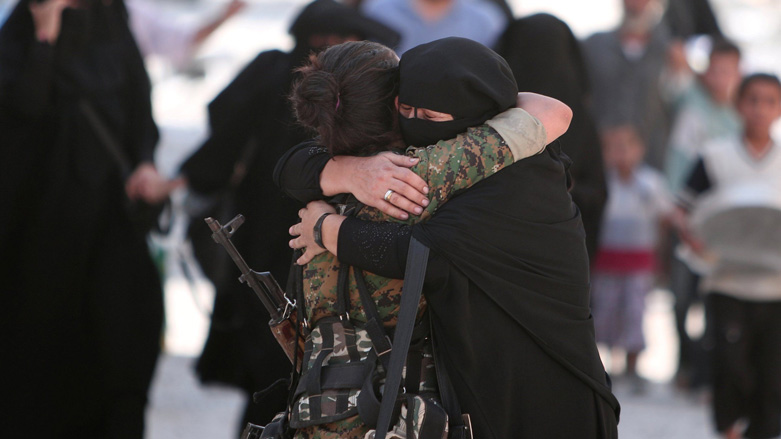Syrians prefer SDF to Syrian regime, Deputy Coalition Commander says

WASHINGTON DC, United States (Kurdistan24) – Maj. Gen. Rupert Jones, a British officer and Deputy Commander of the US-led coalition fighting the Islamic State (IS) in Iraq and Syria, told Pentagon reporters on Wednesday that in his experience, Syrians prefer living under the authority of the Kurdish-led Syrian Democratic Forces (SDF) to living under the regime of Bashar al-Assad.
Speaking by teleconference from the Baghdad headquarters of the Combined Joint Task Force-Operation Inherent Resolve (CJTF-OIR), Jones explained that he had recently met with a “large group” of Internally Displaced Persons (IDPs), most of whom had come from areas that had been cleared of IS fighters by forces loyal to the Syrian regime.
“I asked them why they had not remained where they were,” Jones said, now that their area was free of IS.
“They were unequivocal,” the British officer explained. “They wanted to come to the SDF area, where they see the best prospects for their families.”
“They were effusive in their praise of how they’ve been treated by the SDF and by the Raqqa Internal Security Force (RISF)” he added.
The RISF is a relatively new organization, which serves as the “hold force” after the SDF has pushed IS out of an area.
Once the SDF is “sufficiently confident that security is stable,” they hand it over to the RISF, so the SDF can “concentrate” its “fighting power closer to the front,” Jones explained.
The RISF is “overwhelmingly Arab,” and the young men who serve in it come from the area they patrol.
“It’s a good job. You get paid, you get a uniform, and you get to secure your own village,” Jones said.
“It’s low-level security; it's checkpoints,” he explained. “It’s building confidence in the people.”
As much as the coalition is satisfied with the achievements of the SDF, led by the Kurdish People’s Protection Units (YPG), and the RISF, regional states—Turkey, Iran, and Syria—oppose it.
On Wednesday, US Secretary of Defense James Mattis was in Ankara where he met Turkish President Recep Tayyip Erdogan. Once again, Erdogan expressed his strong disapproval of the US alliance with the YPG.
This has long been a point of dispute between the US and Turkey, and as the defeat of IS in Syria and Iraq approaches, it remains to be seen how events will play out.
Iran is the Assad regime’s closest ally. Last week, the Chief of Staff of Iran’s Armed Forces, Maj. Gen. Mohammad Hossein Baqeri, made an unusual, three-day trip to Turkey—the first visit by an Iranian Chief of Staff since Tehran’s 1979 revolution.
Somewhat conflicting accounts of those meetings emerged. Turkish officials said they had agreed on joint action against the Kurdistan Workers’ Party (PKK), although Tehran denied it.
Baqeri claimed that an understanding was reached on the “full establishment” of Syrian sovereignty “over different regions, especially in the North.” Ankara did not contradict his claim.
Editing by G.H. Renaud
